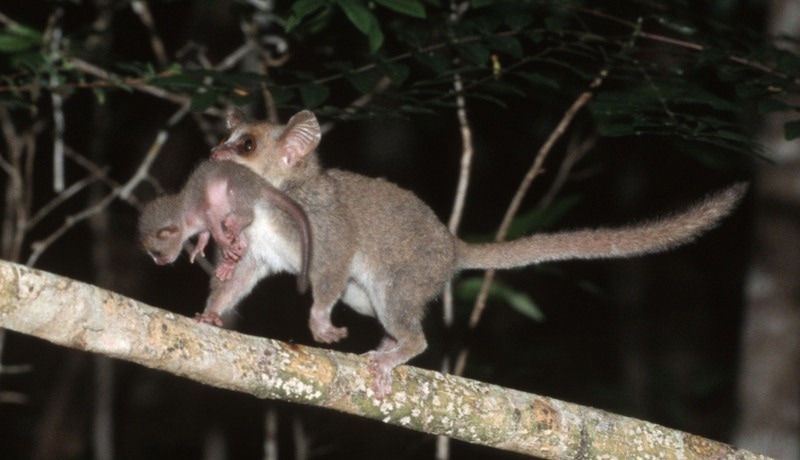Scientists from the German Primate Center–Leibniz Institute for Primate Research, along with associates from the University of Zurich, examined long-term data from Madagascar and discovered that climate change is disrupting mouse lemur populations and heightening their risk of extinction.
 A female grey mouse lemur (Microcebus murinus) carrying an infant. Image Credit: Manfred Eberle.
A female grey mouse lemur (Microcebus murinus) carrying an infant. Image Credit: Manfred Eberle.
Mouse lemurs are small, have a great reproductive output, and reside in Madagascar’s forests. Offspring are born during the five-month rainy season, and a fat pad is formed to help them survive the cool dry season when food is scarce. But what if the rainy season becomes drier and the dry season becomes warmer? Will mouse lemurs adapt to climate change, thanks to their high reproductive output?
The reality that climate change is increasing population density fluctuations and, as a result, extinction risk in a fast-paced, ecological generalist is an ominous warning signal for possible biodiversity losses in the tropics (PNAS).
Climate change impacts have primarily been researched in large, long-lived animals with low reproductive output. Because small mammals with great reproduction rates typically adapt well to changing environmental conditions, they have received little attention in the context of climate change.
Claudia Fichtel and Peter Kappeler of the German Primate Center–Leibniz Institute for Primate Research (DPZ) have been studying lemurs in Madagascar for many years, amassing a unique data set that will help address this information gap.
Identifying Trends with Long-Term Data
Peter Kappeler and Claudia Fichtel analyzed the demographic structure of a mouse lemur population at the DPZ research station in Madagascar for 26 years, from 1994 to 2020. Climate data from the same time period suggest that the rainy season became drier and the dry season became warmer in this location. They evaluated the data with researchers from the University of Zurich and discovered growing mortality as well as rising reproductive rates.
These opposing trends have prevented a collapse of the mouse lemur population, but have nevertheless led to a destabilization of the population, as the already fast life cycle of the animals has been further accelerated.
Claudia Fichtel, German Primate Center–Leibniz Institute for Primate Research
Extinction Risk Increases
Fluctuating population levels owing to climate change represent a serious threat to animals and may lead to extinction.
Our results show that even an animal species that is supposedly able to adapt easily to changing environmental conditions thanks to a high reproductive rate is threatened in its survival by climate changes.
Peter Kappeler, German Primate Center–Leibniz Institute for Primate Research
This is bad news because lemurs, which only exist in Madagascar, are the world's most endangered mammals.
In the future, data on the demographic stability of a population should also be included when classifying the risk of extinction of an animal species. Since this requires data from long-term observations, this is not yet possible for many animal species.
Claudia Fichtel, German Primate Center–Leibniz Institute for Primate Research
Journal Reference:
Ozgul, A., et al. (2023). Destabilizing effect of climate change on the persistence of a short-lived primate. Proceedings of the National Academy of Sciences. doi.org/10.1073/pnas.2214244120.
Source: https://www.dpz.eu/en